The watershed: A career-determining experience
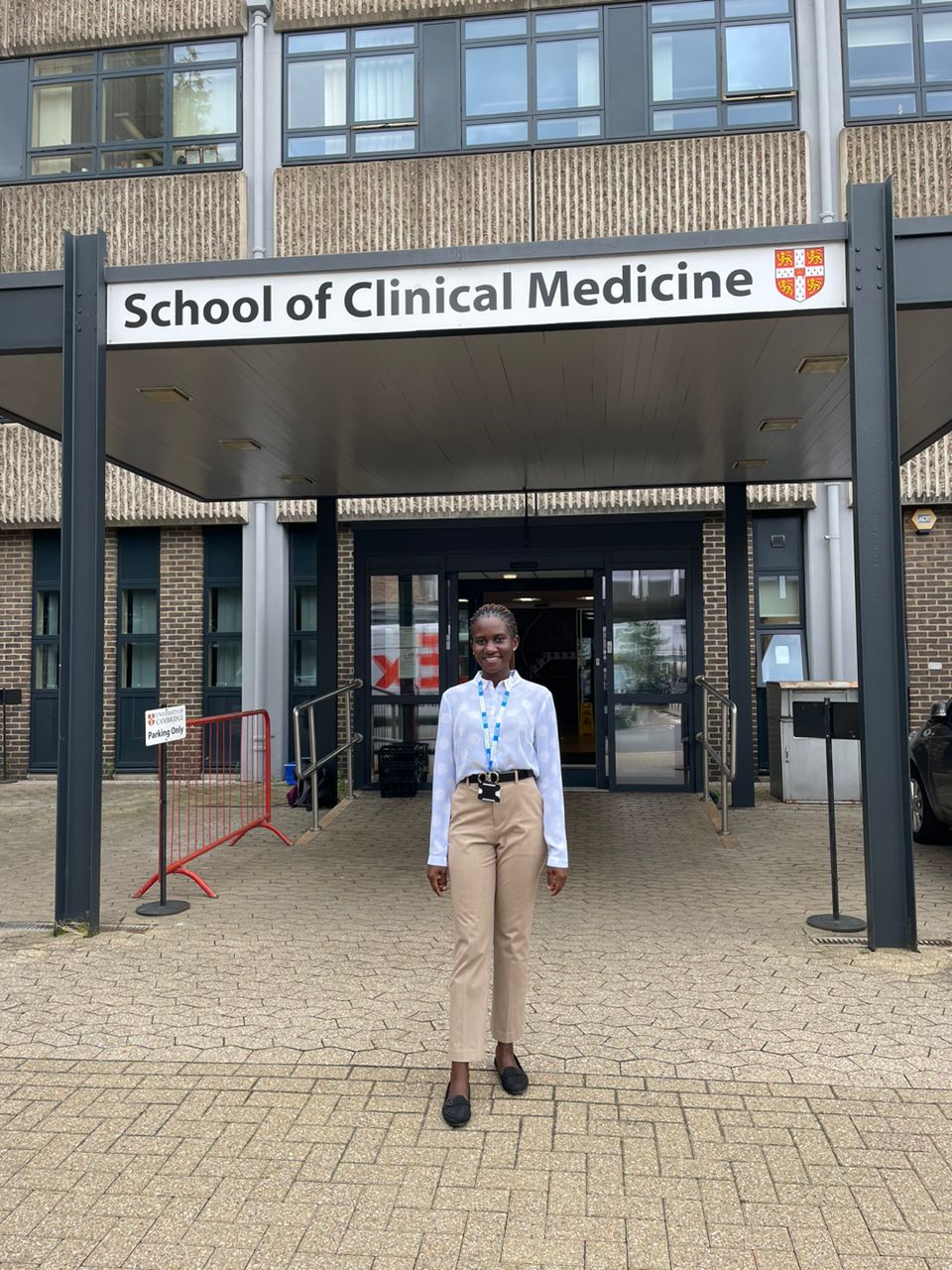
February 7th 2023, marked the beginning of the journey. It was the day I expressed my long-held interest in the field of oncology, by applying to the international office of Makerere University College of Health Sciences. I had no idea that it would mark the start of such a beautiful, unforgettable event!
We are honoured to represent the second cohort of the Cambridge-Africa Makerere University medical student exchange program. This partnership started following the visit of Corinna Alberg from Cambridge-Africa and Maike De La Roche from CRUK CI to the Uganda Cancer Institute. They discovered that there were overwhelming number of patients compared to that of Oncologists. Discussions were kicked off on how this could be improved. It was discovered that student doctors had little interest in pursuing a career in oncology and therefore in order to overcome this, an exchange programme partnership for two undergraduate students who expressed interest in oncology between Makerere University College of Health Sciences and the University of Cambridge was proposed. I was one of the two students chosen after expressing interest through writing and meeting the requirements set by the university. The first group came last summer.
We set off from Entebbe International airport, Uganda, on Thursday 22nd 2023, at exactly 5:30pm, aboard Qatar airways. We landed at Gatwick airport at 6am, Friday 23rd 2023.
We took the train to Cambridge, passing through green levelled meadows and admiring the breath-taking countryside. The elective administrator of Cambridge University, Ms. Cassandra Mura, welcomed me and Yvonne Nakibirango when we arrived. She showed us around the clinical school and gave us all the necessary materials we would need for the placement, including the NHS cards we would need to access Addenbrookes Hospital. Our supervisor, Dr. Martin Besser, gave us a thorough tour of the facility after which he introduced us to the haematology team. The entire placement was for 6 weeks. Weeks 1 through 3 were spent in haematology.
Weeks 4 to 6 were spent in the oncology unit.
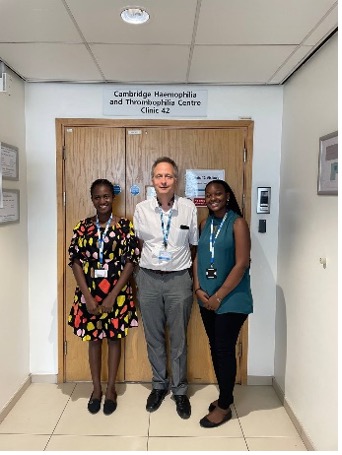 With Dr. Martin Besser, our haematology supervisor
With Dr. Martin Besser, our haematology supervisor
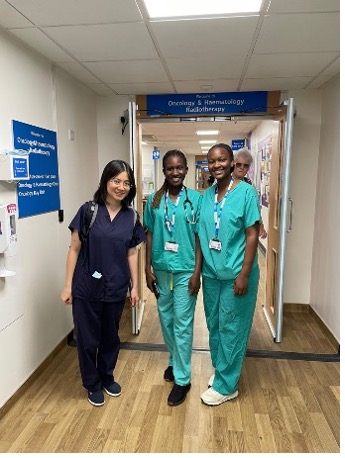 With the oncology consultant, Huiqi Yang and Yvonne Nakibirango
With the oncology consultant, Huiqi Yang and Yvonne Nakibirango
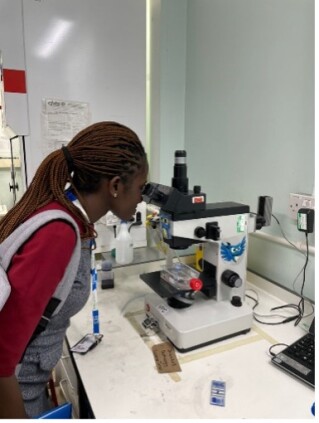 The entire experience exceeded my expectations. Learning took place in the wards and clinics. The doctors were very kind, patient-focused, secure, and reassuring. I was exposed to contemporary technological developments for cancer diagnosis and treatment throughout my placement. The accurate and prompt results of radiological and laboratory tests, the prescription of targeted therapies, the extensive use of immunotherapies when it came to oncology, the numerous ongoing clinical trials and research, including those at the Cambridge Clinical Research Centre and at Cancer Research UK Cambridge Institute (CRUK CI), such as the use of a dry blood smear for early cancer detection, further shone a bright light on the future as the majority of the lethal cancers would be no longer incurable. Other treatments including bone marrow transplants and apheresis were also aiding patient recovery. With the help of the Epic system, a type of electronic record keeping, patients' information about their disease and treatment is preserved very securely with only authorized access. Without forgetting the simulation competition that we also attended at the Royal Papworth, the voice recognition device that doctors use to take notes without typing information, the doctors typically just speak out their findings to the voice recognition device, and the notes are further displayed, gave me a beautiful experience.
The entire experience exceeded my expectations. Learning took place in the wards and clinics. The doctors were very kind, patient-focused, secure, and reassuring. I was exposed to contemporary technological developments for cancer diagnosis and treatment throughout my placement. The accurate and prompt results of radiological and laboratory tests, the prescription of targeted therapies, the extensive use of immunotherapies when it came to oncology, the numerous ongoing clinical trials and research, including those at the Cambridge Clinical Research Centre and at Cancer Research UK Cambridge Institute (CRUK CI), such as the use of a dry blood smear for early cancer detection, further shone a bright light on the future as the majority of the lethal cancers would be no longer incurable. Other treatments including bone marrow transplants and apheresis were also aiding patient recovery. With the help of the Epic system, a type of electronic record keeping, patients' information about their disease and treatment is preserved very securely with only authorized access. Without forgetting the simulation competition that we also attended at the Royal Papworth, the voice recognition device that doctors use to take notes without typing information, the doctors typically just speak out their findings to the voice recognition device, and the notes are further displayed, gave me a beautiful experience.
Visiting the laboratories at Addenbrookes
I was also fortunate to attend the Kampala Cambridge meetings on maternal and neonatal health when several doctors from Uganda were hosted. I felt very motivated by all the wonderful initiatives and relationships that were addressed, and knowing that most of the attendees were once medical students like me, was inspiring.
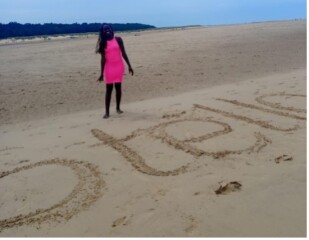 On the lighter side, I had time to travel to a number of intriguing locations within and outside of Cambridge. Together with other elective students, we went to several of the locations. We visited King's College Chapel, the Cambridge Eagle, one of the Scientific Historic Pubs, and Tenpin Cambridge for some bowling. Right now, I think this is one of my favorite games. The Fitzwilliam Museum and the Corpus Clock were among places we went to. We took a bus to London one weekend and visited Buckingham Palace, where we saw the changing of the guard. While still in London, we visited Big Ben and the London Eye. We also went punting on the Cam River. However, the trip to the North Sea coastline, Wells-next-the-Sea in Norfolk, was the most memorable of all.
On the lighter side, I had time to travel to a number of intriguing locations within and outside of Cambridge. Together with other elective students, we went to several of the locations. We visited King's College Chapel, the Cambridge Eagle, one of the Scientific Historic Pubs, and Tenpin Cambridge for some bowling. Right now, I think this is one of my favorite games. The Fitzwilliam Museum and the Corpus Clock were among places we went to. We took a bus to London one weekend and visited Buckingham Palace, where we saw the changing of the guard. While still in London, we visited Big Ben and the London Eye. We also went punting on the Cam River. However, the trip to the North Sea coastline, Wells-next-the-Sea in Norfolk, was the most memorable of all.
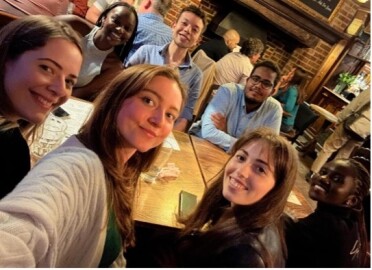 With other elective students at Cambridge Eagle: Stella from Uganda, Maria Borg from Malta, Alena from Switzerland, Cosima from Switzerland, Yvonne from Uganda, Alex from Mexico and Muhammad from Sudan.
With other elective students at Cambridge Eagle: Stella from Uganda, Maria Borg from Malta, Alena from Switzerland, Cosima from Switzerland, Yvonne from Uganda, Alex from Mexico and Muhammad from Sudan.
I want to express my gratitude to the consultants, registrars, nurses, patients and secretaries who welcomed me so warmly at the many receptions, especially those at the clinical school's medical library. Numerous doctors helped me academically in the wards and clinics, and some even organized special lectures for me. I would love to name a few of them: Drs. Huiqi Yang, Mark Robinson, Will Thomas, and Martin Besser, Camilleri Marquitta, Andrew King, James Brenton, Emily Symington, Dr. George Follows, Emmy Dickens, Alan Waren, Bulusu Ramesh, Duncan Brian, and everyone else I was unable to name.
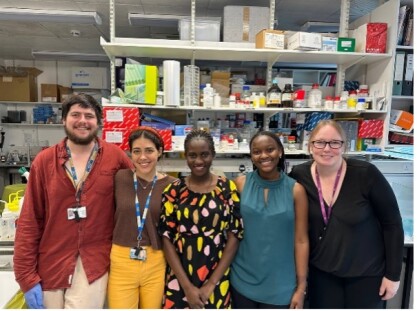 Special thanks to Professor Suzanne Turner, a professor of childhood cancers, and Marta Ferraresso, who spoke with us about their ongoing research on childhood Burkitt lymphoma, both in UK and Uganda.
Special thanks to Professor Suzanne Turner, a professor of childhood cancers, and Marta Ferraresso, who spoke with us about their ongoing research on childhood Burkitt lymphoma, both in UK and Uganda.
I appreciate Dr. Isobel Fitzgerald, the Electives lead, School of clinical medicine Cambridge University, for her efforts in arranging for us to tour the intensive therapy unit through Dr. Iain Goodhart and Ms. Evelyn Brealy of Cambridge Global Health Partnerships who connected us with Dr. Charlotte Patient, who provided us with an opportunity to explore obstetric care at the Rosie Hospital.
We are grateful to Ms. Susan Nassaka of Makerere University's foreign office and Ms. Corinna Alberg of the Cambridge-Africa programme for their tremendous assistance and support in making this placement a success.
Sincere appreciation is extended to Makerere University, Cambridge-Africa Programme, and Cambridge Global Health Partnerships for providing the funding for the placement, which included the flight, the visa fee, the accommodation fees, health insurance, and a living stipend. I hope that this cooperation grows and expands so that more students can have comparable life-changing experiences.
With the above experience, I feel that the already burning passion in oncology has been taken a step further. Additionally, I believe I have been moulded into a better doctor in-the-making – one with an open mind ready to offer clinical care to the Ugandans ailing with cancer.
Together we can beat cancer sooner, rather than later.
By Nakaye Stella.

